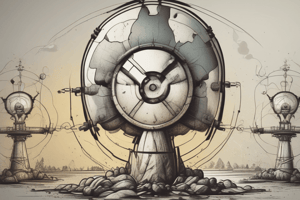Podcast
Questions and Answers
What is the minimum requirement for a fissile material to undergo nuclear fission?
What is the minimum requirement for a fissile material to undergo nuclear fission?
- The material should be in a liquid state
- The material should be in a gaseous state
- The size of the material should not be less than a critical size (correct)
- The material should be in a solid state
Which of the following transmutation reactions involves the absorption of a proton by a nucleus?
Which of the following transmutation reactions involves the absorption of a proton by a nucleus?
- n, γ type
- γ, n type
- n, α type
- d, p type (correct)
What is the primary difference between nuclear fission and nuclear fusion?
What is the primary difference between nuclear fission and nuclear fusion?
- The temperature required for the reaction
- The energy released during the reaction
- The type of nuclei involved in the reaction (correct)
- The percentage efficiency of the energy conversion
Which of the following synthetic elements can be produced through transmutation by neutrons?
Which of the following synthetic elements can be produced through transmutation by neutrons?
What is the energy released during nuclear fusion, in comparison to nuclear fission?
What is the energy released during nuclear fusion, in comparison to nuclear fission?
What is the term given to the process of transforming one element into another?
What is the term given to the process of transforming one element into another?
What type of particles are more effective in producing nuclear reactions?
What type of particles are more effective in producing nuclear reactions?
Which of the following is an example of transmutation by alpha particles?
Which of the following is an example of transmutation by alpha particles?
What is the process of creating new, radioactive elements not found naturally?
What is the process of creating new, radioactive elements not found naturally?
What is the symbol for a neutron?
What is the symbol for a neutron?
What is the process by which a heavier atom splits into smaller fragments, releasing a large amount of energy?
What is the process by which a heavier atom splits into smaller fragments, releasing a large amount of energy?
What type of transmutation involves bombarding an atom with protons to produce a new element?
What type of transmutation involves bombarding an atom with protons to produce a new element?
What is the term used to describe elements with atomic numbers greater than 92, which are not found naturally and are produced artificially?
What is the term used to describe elements with atomic numbers greater than 92, which are not found naturally and are produced artificially?
What type of transmutation involves bombarding an atom with neutrons to produce a new element?
What type of transmutation involves bombarding an atom with neutrons to produce a new element?
What is the process by which two or more atomic nuclei combine to form a single, heavier nucleus, releasing energy in the process?
What is the process by which two or more atomic nuclei combine to form a single, heavier nucleus, releasing energy in the process?
What is the formula for the total time of a radioactive substance?
What is the formula for the total time of a radioactive substance?
What is the condition for radioactive equilibrium?
What is the condition for radioactive equilibrium?
What is the unit of radioactivity in the SI system?
What is the unit of radioactivity in the SI system?
What is the relationship between the decay constant and the range of the α-particle emitted?
What is the relationship between the decay constant and the range of the α-particle emitted?
What is the conversion of one element into another by artificial means known as?
What is the conversion of one element into another by artificial means known as?
What is the time required by a given amount of a radioelement to decay to one-half of its initial value?
What is the time required by a given amount of a radioelement to decay to one-half of its initial value?
At a steady state, what is the relationship between the amounts of different radioelements present in a reaction series and their radioactive constants?
At a steady state, what is the relationship between the amounts of different radioelements present in a reaction series and their radioactive constants?
What is the unit of radioactivity defined as the amount of any radioactive material that gives 3.7 × 10^10 disintegrations per second?
What is the unit of radioactivity defined as the amount of any radioactive material that gives 3.7 × 10^10 disintegrations per second?
What is the implication of the half-life period being independent of the amount of the radioelement?
What is the implication of the half-life period being independent of the amount of the radioelement?
Why is it preferred to say that a radioelement is in a steady state rather than in equilibrium state?
Why is it preferred to say that a radioelement is in a steady state rather than in equilibrium state?
What is the average life period of a radioisotope approximately equal to?
What is the average life period of a radioisotope approximately equal to?
What is the unit of radioactivity that is defined as the amount of a radioactive substance which undergoes?
What is the unit of radioactivity that is defined as the amount of a radioactive substance which undergoes?
What is the relationship between the decay constant and the average life period of an element?
What is the relationship between the decay constant and the average life period of an element?
What is the specific activity of a radioactive isotope?
What is the specific activity of a radioactive isotope?
What is the relationship between the curie and the rutherford units of radioactivity?
What is the relationship between the curie and the rutherford units of radioactivity?




